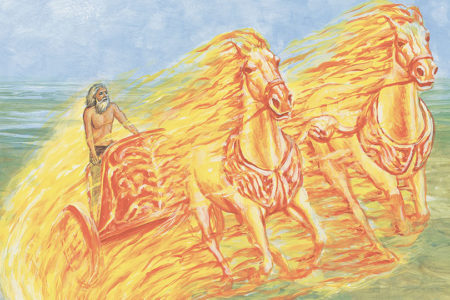Israel’s Superficial Repentance
Hosea 6:1-11
A doctor once stated, “Three hundred of my patients, when notified they were dying, repented of their sins and professed faith in God. Once they were restored to health, only ten of the three hundred manifested any evidence of a changed life.” This unfortunate statistic is true not only of people but of nations as well.
In chapter five of Hosea, God pronounced judgment on Israel; He sentenced Ephraim to be consumed slowly and silently like a woolen garment eaten by a moth. God also said He would allow Israel to be torn in pieces and carried away to the den of her oppressors. And as a lion returns to its den, God would return to His place in heaven and ignore Israel’s cries for restoration until “they acknowledge their offense, and seek my face” (v. 15). It has always been God’s purpose to use judgment not to destroy Israel but to bring the nation to repentance (cf. 2:5–7). In judgment, God leaves the door of His grace open, providing Israel with the opportunity to return to Him in sincerity.
Israel’s Immediate Response
Sensing her hopeless condition, Israel cried out, “Come, and let us return unto the LORD; for he hath torn, and he will heal us; he hath smitten, and he will bind us up” (6:1). The people realized that if they were to survive their affliction, only God, the Great will be swiftly restored. This scenario is not the case either; the northern kingdom is yet to be restored as a nation. Another view teaches that this phrase speaks of the reestablishment of the Jews in their land following the Babylonian Captivity. This explanation also is not likely because the verse refers to a specific time when the northern tribes of Israel are restored to the land. The Bible teaches that the Assyrians destroyed Israel (2 Ki. 17:4–23); it would be many centuries before Israel would be revived and raised up (3:4–5).
Still others teach that the phrase after two days will he revive us means that after two thousand years (a day as a thousand years and a thousand years as a day), at Christ’s Second Coming, Israel will be given spiritual life. They teach that the words in the third day he will raise us up refer to the twelve tribes being restored to the land at the beginning of Christ’s thousand-year reign on earth. While it is true that at Christ’s Second Coming, Israel will be revived to spiritual life, raised up as a nation, and replanted in her land (Ezek. 37:12–25), the argument is, nevertheless, flawed. The destruction of Israel mentioned in Hosea refers not to the Roman destruction two thousand years ago but to the Assyrian destruction more than twenty-seven hundred years ago. Hosea 6:2 has nothing to do with a two thousand-year time period but simply sets forth Israel’s expectation of being swiftly restored to her former state once she returned to God.
Israel had a shallow realization of spiritual renewal. The Israelites thought God would restore them if they simply acknowledged His presence and preeminence. “Then shall we know, if we follow on to know the LORD; his going forth is prepared as the morning; and he shall come unto us as the rain, as the latter and former rain unto the earth” (v. 3). In other words, as assuredly as the morning sun burns away the gloom of darkness and the water brings life to parched ground, so Israel believed that by acknowledging God, she would experience spiritual renewal and restoration. Again, these were empty words. God requires true repentance—repentance that involves contrition of heart, confession, forsaking of sin, and a change in conduct.
Israel’s Insincere Repentance
Thus the Lord, who knows the hearts of all men, asked Israel and Judah a rhetorical question: “O Ephraim, what shall I do unto thee? O Judah, what shall I do unto thee? For your goodness [faithfulness] is like a morning cloud, and like the early dew it goeth away” (v. 4). God had tried everything to woo Israel and Judah away from their idolatry and bring them to repentance and commitment to Him, but His attempts were futile. If severe punishment did not bring them to repentance, what more could be done? God asked the question to draw Israel’s attention to her lack of love and piety toward Him. Her faithfulness was like a morning cloud that does not deliver rain and like the drops of early morning dew that promise refreshment but dry up in the rising sun. Such “faithfulness” was neither consistent nor permanent but superficial and fleeting.
Hosea reminded Israel and Judah of the process God used to bring judgment on them. “Therefore have I hewed them by the prophets; I have slain them by the words of my mouth; and thy judgments are as the light that goeth forth” (v. 5). God used the prophets’ words as a knife to whittle away at the immoral practices of Israel and Judah, hoping to shape them according to His will as one sculpts wood. Since the prophets’ words did not bring either nation to repentance, however, God spoke; and His judgment fell on them like a flash of lightning.
Hosea warned Israel and Judah that God cannot be propitiated by a multitude of sacrifices and offerings. Presented without love of God and sincere holiness, they are unacceptable to the Lord. God said, “For I desired mercy [loyal love], and not sacrifice, and the knowledge of God more than burnt offerings” (v. 6). Pleasing God can only be accomplished by knowing Him personally and ordering our conduct according to His will. Israel was unable to experience or express this kind of commitment to God because they had lost their knowledge of Him. After King Saul had transgressed against God, Samuel told him,
Hath the LORD as great delight in burnt offerings and sacrifices, as in obeying the voice of the LORD? Behold, to obey is better than sacrifice, and to hearken than the fat of rams. For rebellion is as the sin of witchcraft, and stubbornness is as iniquity and idolatry (1 Sam. 15:22–23).
Soulless sacrifice offered by men steeped in sin was and is, even today, an abomination to God.
Israel’s Immoral Rebellion
In the following verses, God provides a number of similes and metaphors to illustrate the gross paganism, immorality, and murderous actions of ancient Israel. First, the Lord said, “But they, like men [lit. Adam], have transgressed the covenant; there have they dealt treacherously against me” (v. 7). Some believe that the word Adam refers to the man Adam. In the Edenic Covenant, God set forth the blessings Adam would receive by obediently following Him. But in the Adamic Covenant, He set forth the conditions of life that fallen man must now endure until the Kingdom Age (Gen. 3:15–19). Like Adam, Israel forfeited the blessings of her covenant relationship by disobeying God.
Other commentators, however, believe that the word Adam refers to a city of the same name—a town close to Jordan (beside Zarethan), near the mouth of the Jabbok River and eighteen miles above Jericho. It was here where the waters miraculously parted as the Israelites crossed the Jordan River (Josh. 3:16-17). The phrase there have they dealt treacherously [deceitfully] against me (v. 7) could apply to Adam and Eve in the Garden of Eden or to Israel at the city of Adam. Commentators disagree on the meaning of this verse.
The second illustration refers to the city of Gilead. “Gilead is a city of those who work iniquity, and is polluted [tracked] with blood” (v. 8). Gilead is a mountain region stretching about sixty miles long and twenty miles wide, bounded on the north by Bashan and on the south by Moab and Ammon, extending from the Sea of Galilee to the Dead Sea (Gen. 31:21, 25; Dt. 3:12–17). Hosea 6:7 probably refers not to the area of Gilead but to the city of Ramoth Gilead, which had become a rendezvous for wicked men. Ironically, it was one of the cities of refuge (Josh. 21:38) but was now a city known for its brutal murders.
The third illustration refers to Shechem, another city of refuge located between Ebal and Gerizim (Josh. 21:21). It had become an area where “troops of robbers [marauders] wait [in ambush] for a man” and “the company [band] of priests murder in the way by consent; for they commit lewdness” (v. 9).
Shechem lay to the north of Jerusalem and was located on the main road that pilgrims used to travel to the annual feast days in Jerusalem. It was in Shechem where priests from Israel, steeped in Baal worship, waited to plunder those going to Jerusalem. If the people offered any resistance, these priests often murdered them. Furthermore, the priests committed lewdness, meaning the vilest of sexual sins—incest (Lev. 18:17), cult prostitution (Lev. 19:29), rape (Jud. 20:5–6), and adultery (Job 31:9–11).
Chapter 6 closes with God’s condemnation of the northern and southern kingdoms of Israel. Speaking on behalf of the Lord, Hosea said, “I have seen an horrible thing in the house of Israel; there is the harlotry of Ephraim, Israel is defiled” (v. 10). Ephraim was the major tribe of Israel that practiced harlotry—religious prostitution connected with fertility rites found in Baal worship. This practice had spread from Ephraim throughout all Israel and eventually to Judah.
Thus Judah would not escape judgment. “Also, O Judah, he hath set an harvest for thee” (v. 11). Judah had committed the same sins as Israel and would reap a harvest of destruction.
Yet destruction is not the final destiny of Israel, for God said He will return “the captivity of my people” (v. 11). One day God will restore both the northern and southern kingdoms. This return will come to ultimate fruition at the inception of the Millennial Kingdom (Ezek. 37:15–22).
Israel’s superficial repentance carries an important lesson for us today. It is not enough for a wayward believer to feel sorry for his or her sin and simply say, “I will return to the Lord and He will take away my sin.” This is not true repentance. True repentance takes place when we feel the awesome convicting power of the Holy Spirit deep in our souls and realize that we have sinned against Almighty God. Truly repentant sinners will not only confess and forsake their evil ways but exhibit a turnabout in their lives and alter their conduct accordingly.
Do you, like Israel, tolerate sin in your life? If you do not deal with it, God will!






